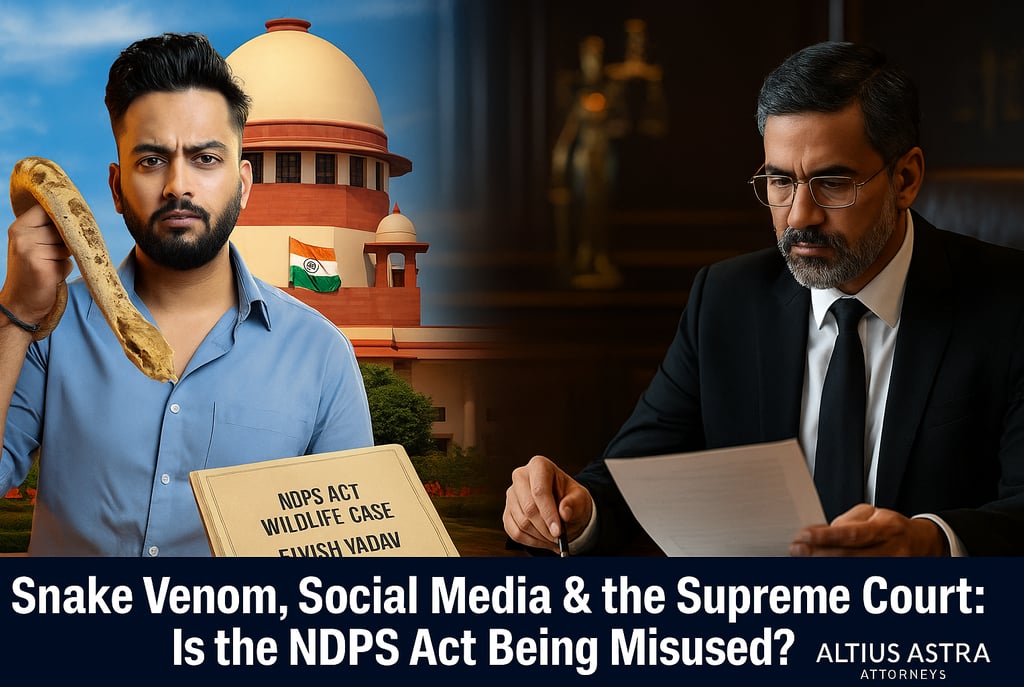"Snake Venom, Social Media & the Supreme Court: Is the NDPS Act Being Misused?"
Supreme Court stays trial in Elvish Yadav's NDPS case. Was the influencer unfairly targeted? Read the legal analysis by Advocate Sachin Gupta, Criminal Lawyer in Delhi NCR.
Adv Sachin Gupta | Partner | Altius Astra Attorneys
8/7/20253 min read


Supreme Court NDPS Act Ruling sparks national debate on legal overreach in influencer culture
Introduction:
Is it justice or judicial overreach? That’s the question buzzing through legal circles ever since the Supreme Court of India stayed trial proceedings against YouTuber Elvish Yadav in the so-called “snake venom and rave party” case. The matter is as bizarre as it is controversial wildlife laws, NDPS charges, media frenzy, and a social media influencer caught in the storm.
But behind the headlines lies a deeper legal debate: Is the NDPS Act being used selectively? Are digital personalities easy targets for sensational charges? This case has triggered essential conversations around the NDPS Act, the Wildlife Protection Act, and the right to fair trial in India.
Supreme Court’s Interim Relief: A Breather or a Red Flag?
On August 6, 2025, a two-judge bench of the Hon’ble Supreme Court—Justices MM Sundresh and Joymalya Bagchi granted an interim stay on the trial court proceedings. The trial court was moments away from framing charges when the apex court intervened, after Senior Advocate Mukta Gupta argued that procedural safeguards under the NDPS Act were blatantly ignored.
Let’s be clear: the charges weren’t mild. The FIR had invoked multiple sections of the NDPS Act (Sections 8, 22, 29, 30, 32), Wildlife Protection Act, and IPC provisions including criminal conspiracy. The alleged crime? Use of snake venom in rave parties, and appearance of snakes in a music video.
But there’s a catch. No narcotics were recovered. No snakes were seized from Yadav. And no direct link placed him at the scene.
So why did the courts entertain the matter this far?
The Legal Quagmire: Guilt by Fame?
It’s no secret that influencers walk a fine line between bold content and legal scrutiny. But the NDPS Act—known for its harsh sentences—cannot be applied merely because someone has a public profile.
Here’s what the defence highlighted:
The FIR was filed by someone no longer legally authorised under the Wildlife Protection Act.
No material evidence venom, narcotics, or psychotropic substances was recovered from Yadav.
He wasn’t even present at the event where the supposed offence occurred.
Sections 27 & 27A of the NDPS Act, initially added for effect, were later dropped by the police themselves.
If that doesn’t raise eyebrows, what will?
In fact, one could argue that public popularity became the very reason for his legal troubles a dangerous precedent in the age of virality.
Key Takeaways for Legal Professionals and Common Citizens:
The NDPS Act is a stringent law. Courts have reiterated that its provisions require strict compliance before framing charges. Mere suspicion cannot substitute for solid evidence.
Wildlife Protection laws are serious, but they require authorised complaints and evidence of actual harm or trade. Filming with a non-poisonous snake, if owned legally, may not breach the law.
Trial courts cannot be used for moral policing. A fair justice system must insulate itself from media hype and public opinion.
Digital creators should consult legal experts when content involves sensitive subjects Animals, substances, or acts that may fall under regulatory oversight.
Are We Criminalising Creators?
The Elvish Yadav case is no longer just about a rave party or a music video, it’s about how India balances freedom, fame, and fairness in its criminal justice system.
With the Supreme Court’s intervention, the spotlight is back on due process and the abuse of criminal provisions. Will this case become a precedent for protecting creative expression or a reminder that fame has a legal cost?
About the Author:
Advocate Sachin Gupta is a seasoned criminal and matrimonial lawyer in Delhi NCR, known for handling complex NDPS cases, bail matters, and false FIR quashing with strategic precision. He heads Altius Astra Attorneys, a client-centric law firm based in Pitampura, Delhi, providing top-tier legal services in Criminal, Civil, and Constitutional law.
Altius Astra Attorneys
A premier law firm based in Delhi, India, offering legal representation across various practice areas for citizens rights and interests.
© 2025. Altius Astra Attorneys. All rights reserved.
Contact Us
📞 9899290789, 9818786756
📧 contact@altiusastra.com
3C-ED Block, Madhuban Chowk, Pitampura, Delhi-110034
DISCLAIMER
